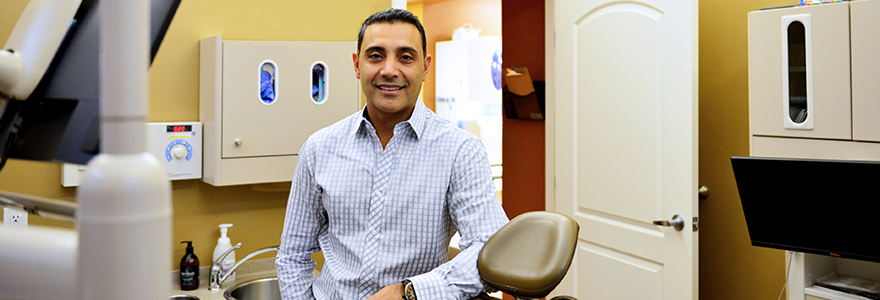An opportunity for change
By Emily Leighton, MA’13
“COVID-19 has impacted everything and nothing at the same time.”
Dr. Anand Soni, DDS’98, reflects on a year of uncertainty and upheaval with sage reflection.
From a logistical perspective, the virus disrupted dental offices around the world. But Dr. Soni points out that the tenets of dentistry – duty to care, accountability, clinical competence – remain, perhaps even stronger as a result.
“With COVID-19, a lot of our time is spent fixing the practical, day-to-day operations, but the end goal hasn’t changed,” he explained. “We are still working to provide the best patient-centred care and to support our communities.”
 As the first lockdown loomed in early March 2020, Dr. Soni worked to get ahead of the curve, acquiring personal protective equipment (PPE) and implementing new office procedures at his London, Ontario practice. “We immediately planned for the worst and we were able to open for emergency care within a few days,” he said.
As the first lockdown loomed in early March 2020, Dr. Soni worked to get ahead of the curve, acquiring personal protective equipment (PPE) and implementing new office procedures at his London, Ontario practice. “We immediately planned for the worst and we were able to open for emergency care within a few days,” he said.
His team switched to a tele-dentistry model, with receptionists working virtually to screen and triage patients. Emergencies were referred to Dr. Soni for appointments via tele-dentistry. He then called in prescriptions or booked patients for in-person appointments at his clinic, if their concern could not be managed by medications.
Collaboration with other dentists in the region was instrumental in ensuring emergency patients were supported. The group’s guiding principle was to keep people out of hospital emergency departments. “With this principle, it’s been easier to stay focused throughout the pandemic,” said Dr. Soni. “Whatever we’re doing today, it’s continuing to support this goal.”
In addition to treating emergency patients referred by colleagues, Dr. Soni also accepted patients from the School’s clinics, reducing his practice’s regular fees by half to accommodate the urgent need. “We didn’t want to be available to Schulich Dentistry patients in name only,” he explained. “Cost is a significant barrier for many and with the regular fees, they wouldn’t have been able to come.”
Dr. Soni’s team provided the care and sent follow-up notes to Dr. Rae Dorion, Assistant Director, Clinical Affairs, in order to coordinate and update patient records.
“The pandemic certainly highlighted the importance of our relationship with Schulich Dentistry," said Dr. Soni. "We need the School to provide training and graduate excellent dental professionals. And the School needs community dentists to support teaching and patient care.”
It is one of several insights Dr. Soni has gleaned from this extraordinary time.
A recent correspondence published in The Lancet argues that the COVID-19 crisis is an opportunity to rethink the future of dentistry and address system-level failures. “Rather than being isolated from mainstream health care, this crisis has clearly shown that dental personnel can be integrated into the wider system,” writes the author.
Locally, dental professionals established an online learning academy via Zoom, a chance to connect and ask questions as the situation evolved. More than 300 dentists regularly joined the sessions, and a local chat group continues to operate as a resource.
“Our community has recognized that we can’t practice alone,” said Dr. Soni. “And now there will always be this backdrop, this shared experience.”
With major impacts to clinical dental education and frustrating circumstances for learners, Dr. Soni wants students to know their future colleagues are here to help them as well. “It’s going to be okay. As new graduates, you will have already experienced a global pandemic, gaining new skills and resilience through the process,” he said. “Community dentists are ready to support and mentor you as you transition from school to practice.”
While some of the logistical changes as a result of COVID-19 may become permanent, such as increased patient screening and additional PPE, Dr. Soni says the dental profession will adapt and get used to these new protocols. Much like changes to airport security, they will become the norm.
“Dentistry is usually fairly immune to market changes, but there’s no way 2020 didn’t impact your practice,” he said. “I’m optimistic that we’ll come out of this more resilient, more community-minded and more aware of our role in providing essential health care.”









